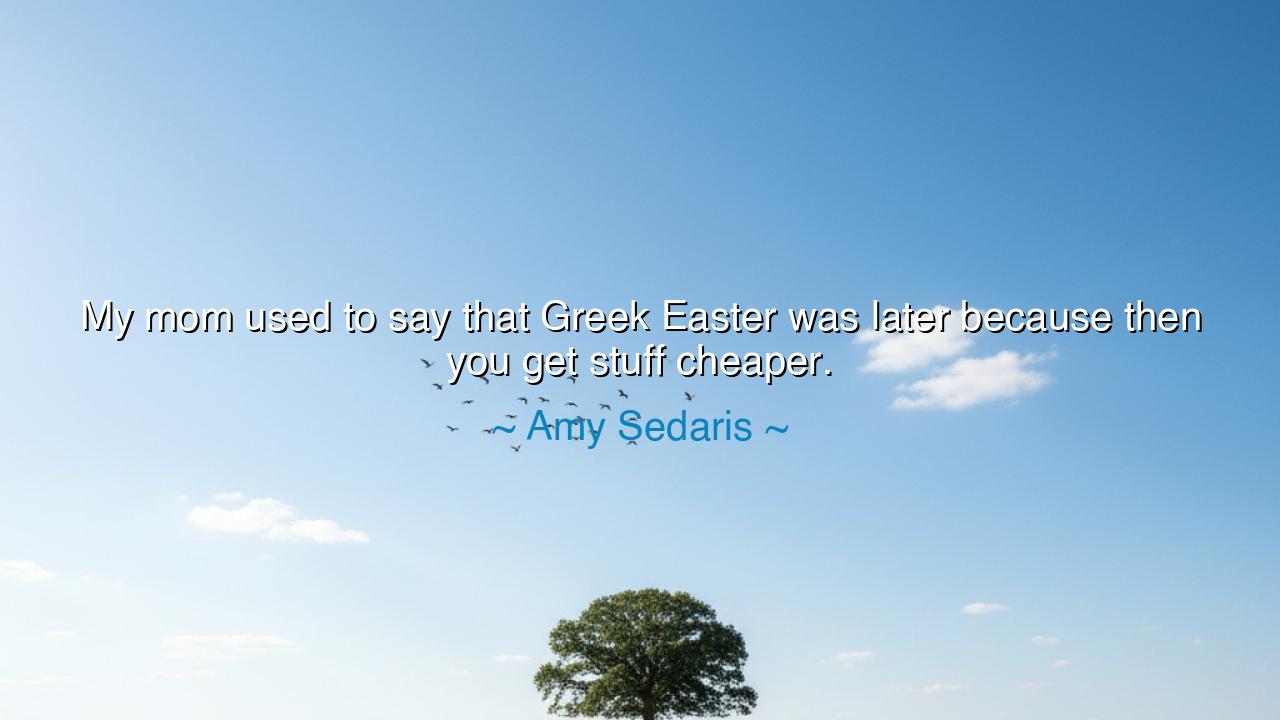
My mom used to say that Greek Easter was later because then you






The words of Amy Sedaris — “My mom used to say that Greek Easter was later because then you get stuff cheaper” — shimmer with humor on the surface, yet like much of the finest wit, they conceal a deeper wisdom about culture, family, and the art of finding light in life’s small peculiarities. It is a quote that speaks, in jest, to the meeting of the sacred and the practical — the collision of the divine calendar with the household economy. Beneath the laughter lies the tender truth that human beings, even amid holy observances, must still live within the world’s realities. And it is precisely in that mingling — of faith and frugality, reverence and resourcefulness — that Sedaris captures the enduring spirit of family and tradition.
In the style of the ancients, we might say: the wise find the sacred in the ordinary, and the ordinary in the sacred. Sedaris’s mother, with her mischievous practicality, teaches a lesson older than any holiday — that joy often comes not from abundance, but from wit, timing, and the capacity to find grace in necessity. Greek Easter, celebrated according to the Julian calendar, often falls weeks after the Western Easter. While theologians and astronomers trace this difference to calculations of the vernal equinox and the Paschal full moon, Sedaris’s mother translates it into the language of daily life: by waiting, you can buy your Easter goods on discount. What sounds like humor is also folk wisdom, born of thrift and gratitude — the kind that sees providence even in the clearance aisle.
The origin of the quote lies in Sedaris’s comedic reflections on her Greek heritage and her mother’s wit, which she has often celebrated in her writings and performances. Her humor carries that distinct flavor of familial truth: the things mothers say half in jest but wholly in love, revealing a worldview shaped by endurance and affection. Behind the laughter, there is a recognition that faith and festivity must always adapt to the rhythms of real life — to budgets, to circumstance, to the everyday burdens of being human. In this way, the quote is not about shopping, but about perspective — about how wisdom often disguises itself as humor, and how humor can carry wisdom more gently than doctrine ever could.
To understand the deeper spirit of Sedaris’s remark, we might recall the story of the ancient Greek women who kept the home fires of faith alive, even in times of hardship and empire. When wars raged and fortunes fell, it was they who continued to prepare the bread, dye the eggs, and light the candles, ensuring that Easter — the feast of resurrection — lived on not as a luxury, but as a necessity of the heart. They knew that faith does not depend on splendor; it survives on creativity. Sedaris’s mother, in her own way, speaks from that lineage: her humor is a modern echo of that ancient resilience — that ability to laugh at scarcity and transform it into abundance.
The humor also touches on something profound about human nature: our tendency to bring the eternal down to earth. In laughing about Easter sales, Sedaris’s mother reveals a truth the philosophers knew well — that the sacred does not stand apart from the mundane, but shines through it. What is Easter if not the story of transformation — of death turned to life, of loss turned to gain? In her playful reasoning, she expresses that same transformation in domestic form: where others see misfortune (a late holiday), she sees advantage (a cheaper celebration). Thus, she fulfills a kind of everyday alchemy — the turning of inconvenience into opportunity, sorrow into laughter.
This spirit of joyful pragmatism has been a mark of survival across generations. Think of immigrant families, arriving in new lands with little but hope, weaving humor into hardship as both shield and light. They could not afford grandeur, so they made feasts from fragments — and in doing so, they found community, dignity, and endurance. Sedaris’s mother’s remark belongs to that same lineage of love: it is the humor of those who know that faith is not about luxury, but about renewal — that laughter can be an act of resurrection.
So let this teaching be carried forward: wisdom often wears the mask of humor. Learn to laugh not at sacred things, but through them — for laughter, too, is a form of grace. When life offers delay or difficulty, see if it may yet yield advantage. When scarcity knocks, answer with wit. And when tradition feels heavy, lighten it with love. For as Sedaris reminds us through her mother’s voice, holiness need not always speak in solemn tones; sometimes, it winks, smiles, and says, “Wait a little longer — the blessings will come cheaper, but they’ll come all the same.”
Thus, even in jest, we find truth: that joy is resourceful, faith is adaptable, and humor is sacred. The mother’s laughter becomes a modern psalm — a reminder that the divine and the domestic have never been far apart, and that sometimes, in seeing the world with both reverence and wit, we discover the deepest kind of wisdom: the ability to celebrate life, not when it is perfect, but when it is perfectly human.






AAdministratorAdministrator
Welcome, honored guests. Please leave a comment, we will respond soon